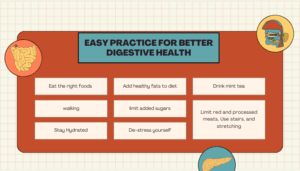Your digestive health is crucial as it is responsible for breaking down food into essential nutrients your body needs. Neglecting your digestive system means the harder to absorb these essential body nutrients. You may be unable to work properly due to these issues.
Many people have occasional or chronic gastrointestinal distress due to dietary restrictions or other underlying health issues. Although constipation and abdominal pains are common symptoms that usually go away on their own, you might try some easy home remedies to see if they help.
Your digestive system is always working to rid your body waste to break down food into energy that your cells can use. Disregarding your digestive system can result in far-reaching consequences. Little changes like modifying your food or adopting healthier living habits may have a significant influence on your digestive health.
Some easy practices for better health and digestion
Some common steps that can help improve your health and digestion are;
-
Eat right food for Better Digestive Health
Americans consume 40-50% of the recommended amount of fiber. A well-rounded diet such as fruits and vegetables include the fiber that beneficial bacteria in the gut require to thrive. The fiber in fruits and vegetables helps with constipation, and their antioxidants may even help prevent cancer. A well-rounded diet contributes significantly to your digestive health. A well-rounded diet contributes significantly to your digestive health. For more tips, visit our guide on Healthy Eating Tips
Some options include Some colorful fruits and vegetables.
-
Add healthy fats to your diet
Maintaining good digestive health may depend on getting reasonable fats in your diet. In addition to making you feel full longer after eating, fats are necessary for the body to absorb several nutrients, including vitamins A, D, E, and K.
Few studies have shown that omega-3 fatty acids may reduce the chances of developing ulcerative colitis and other inflammatory bowel diseases. Fatty fish such as salmon, tuna, mackerel, and sardines, as well as walnuts, almonds, chia seeds, and flaxseeds, are excellent providers of omega-3 fatty acids.

-
Drink mint tea
As an over-the-counter medication, mint tea may be helpful for nausea and indigestion. To prepare a basic mint tea:
- Set out 5-10 spearmint or peppermint leaves.
- Pour in 1 cup of boiling water and let it cool for a while.
- Soak the leaves for 3-5minutes after you cover them with water.
- Squeeze a lemon or a sprinkle of honey (optional).
Research suggests that peppermint leaves may provide short relief for irritable bowel syndrome (IBS) symptoms, such as nausea and vomiting. To completely grasp the science behind this, however, further study is required.
-
Limit red and processed meats
Processed meat is believed to have an increased risk of colon cancer as they have high levels of fat, salt, and nitrates. Heart disease, cancer, and gastrointestinal problems have all been associated with red meat. Chicken, fish, and beans are all good options. Also, cutting down red meat to 2-3 times a week proves can be a great option.
-
Limit added sugars
Excessive sugar consumption can cause imbalance of beneficial bacteria and inflammation. Sugar is an additional ingredient in many items, such as ice cream, baked goods, and candy. Soups, salad dressings, spaghetti sauces, and other processed foods commonly have them, and you may not even notice.
Some good options include whole foods (no additives) and fruits (sweet reward).
-
Stay Hydrated for Improved Digestive Health
Constipation occurs due to lack of water. You can avoid it and promote good gut function by drinking water. The amount of water your body needs depends on factors including your size, level of exercise, and overall health. Every day, an adult should drink 4-6 glass of water. Proper hydration is essential for maintaining good digestive health.
Some good choices that can reduce water deficiency are green tea, black coffee, fat-free milk, and fresh-squeezed juice.
-
De-stress yourself
Experts advise regular exercise, meditation, and deep breathing exercises to alleviate stress. On the other hand, you may discover that unwinding with something as easy and pleasurable as playing with your pet, soaking in a hot tub, reading a wonderful book, or listening to relaxing music does the trick.
Obesity, migraines, IBS, heart disease, stroke, hypertension, depression, and ulcers are some health issues that chronic stress may worsen or create. So, it’s crucial to listen to this advice.
-
Walking
Quick walking is the easiest exercise for intestines. Walking is the healthiest options among all exercises. It targets the abdominal region specifically, it is the ideal exercise to include into your routine.
Take note that this change narrows your intestines, which facilitates the passage of food and waste products through your organs for digestion. This will lead to reduced gas and swelling in your digestive system as well as more regular bowel motions.
-
Use stairs
Next time you’re going to the upper floor, use the stairs rather than the elevator. Blood circulation, lung capacity, and lower body strength will increase due to this. It’s a great approach to do extra exercise every day without having to set aside specific time. If you want to meet your daily step goal of 10,000, stair climbing counts. You may be able to maintain your health by doing all of these little exercises.
-
Stretching
Stretching your muscles on daily basis helps you stay mobile and injury-free. Maintaining flexibility, injury-free mobility, and ease of movement with age is possible with consistent muscle stretching. Stretch for a few minutes both before and after your exercise. Do stretching if you don’t have time to exercise today. If you need to relax while on the way but don’t want to risk interruptions, find a peaceful spot to do it.
Find little ways to stretch every day, like getting out of your car or reaching for an item on a high shelf at the supermarket. You may find that stretching before bed helps you relax and go to sleep faster. You may further reduce your risk of a potentially fatal fall by engaging in balancing exercises like tai chi.
End Note
The great thing is that you are never too old to begin making positive changes to your lifestyle. You have the opportunity to lay the groundwork for good health at young age. Maintaining good health as you age may aid in treating/managing current diseases and preventing of future diseases.

